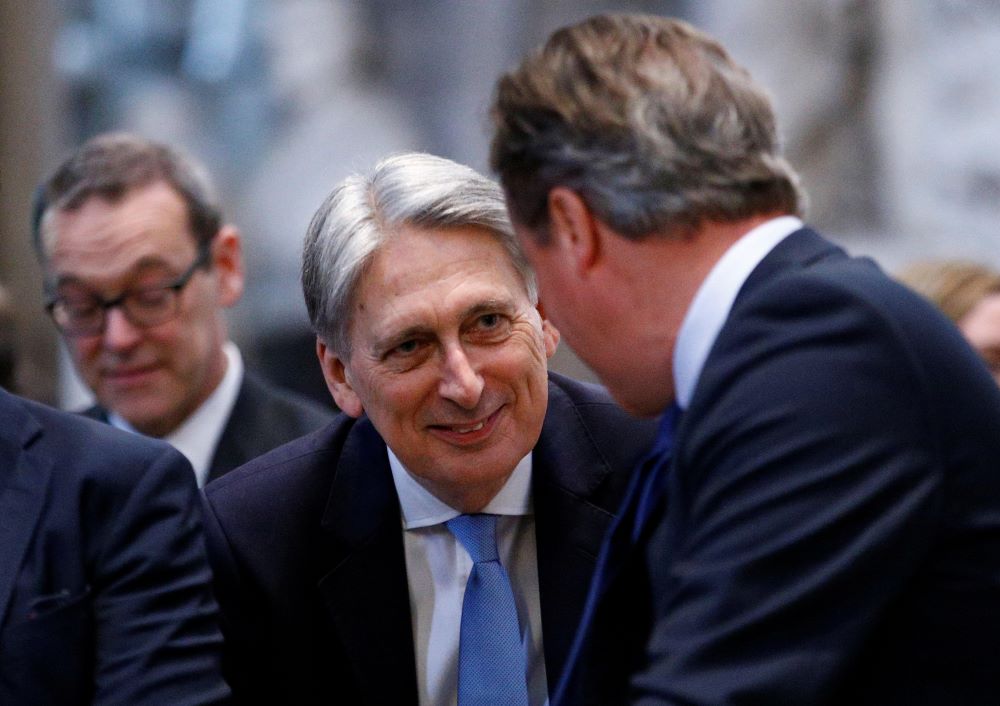Senior Tory Philip Hammond Says Calls To Cut Off Trade With China Are "Unrealistic"
4 min read
Former foreign secretary Lord Hammond has urged the Conservative party to be less ideological in its approach to China, saying it is "unrealistic" to call for cutting off trade with the world's second-largest economy.
Hammond, who also served as chancellor while a Tory MP, said his view on how the UK should approach Beijing put him "at odds" with some Conservatives. However, he told PoliticsHome that the UK "just can't ignore" China's significance to the global economy.
Prime Minister Keir Starmer last week said he wanted “more serious and pragmatic” ties with Beijing after he became the first leader in six years to meet with Chinese Community Party (CCP) leader Xi Jinping. Chancellor Rachel Reeves is expected to visit China in 2025 to meet her counterpart Vice Premier He Lifeng as part of the Government's bid to deepen trade ties.
Lord Hammond agreed with the Government’s current approach, telling PoliticsHome that the UK should look to be in a "middle ground".
“China is a long-term strategic challenger to the United States, and therefore those who see our relationships through the lens of our relationship with the US primarily will be concerned,” he said.
“But China is also the world's second-largest economy, and we just can't ignore that fact.
“We are a trading economy. We have to be in that middle ground where we trade with China”.
Lord Hammond served as defence secretary when former prime minister David Cameron declared in 2011 that there would be a new “golden” age of Anglo-Sino relations. Four years later, Xi made his first and only state visit to the UK, meeting Queen Elizabeth II and visiting Manchester City football club.
Lord Hammond admitted that with hindsight Cameron’s vision was “unrealistically over-ambitious”. But in recent years he said MPs who have espoused “cutting trade with China” were “equally unrealistic”.
“You can't simply cut yourself off from the world's second-largest economy because you disagree with the politics,” he said.
“We disagree with the politics of lots of people, including some of our quite important trade partners, and we have to be pragmatic about the balance between our trade interests and our security interests”.
The former foreign secretary said that China was a fundamental challenger to the global order. The Chinese state was expected to become the world’s largest economy by 2030, but Capital Economics, a think tank, revised its growth rate and projected China's GDP would not take over the US on a sustained basis.
 Former Tory Cabinet minister Lord Hammond and ex-prime minister David Cameron (Alamy)
Former Tory Cabinet minister Lord Hammond and ex-prime minister David Cameron (Alamy)
Lord Hammond praised Starmer’s approach to relations and agreed his approach to pursue a “pragmatic” path was the right one – and that the UK should continue to encourage investment in non-sensitive areas.
“You can’t compromise fundamental security issues,” Lord Hammond said. “Chinese businesses seeking to invest in the UK should be advised to steer clear of anything that will raise strategic questions.
“Chinese companies investing in clearly non-strategic areas should not be a problem and should be welcomed as investors”.
The Conservative Party has had a tumultuous relationship with China since the Cameron government attempted to usher in a new era of positive ties with Beijing.
Tories like Hammond promote a more dovish approach, and while he was chancellor the former MP for Runnymede and Weybridge described the two countries as "natural partners".
Conservative politicians like the party's former leader Iain Duncan Smith, however, campaign for a much harder UK line and say opening British markets to Chinese trade poses a threat to national security. Tories like Duncan Smith argue the UK should not be pursuing closer ties with China while it commits human rights abuses against Uyghur Muslims, undermines democracy in Hong Kong and poses cyber threats to Britain.
Duncan Smith and two other sitting MPs are among nine UK citizens who have been sanctioned by the CCP in recent years.
Speaking to PoliticsHome last week, former national security adviser Lord Ricketts said he feared that Whitehall did not have the level of expertise it needed to support Starmer's policy of a more "pragmatic" relationship with China.
